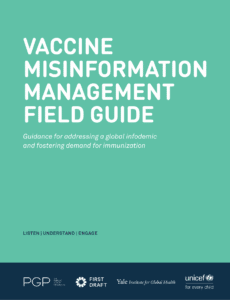Misinformation Alerts
Knowing what misinformation is being shared can help you generate effective messaging.
These insights are based on a combination of automated media monitoring and manual review by public health data analysts. Media data are publicly available data from many sources, such as social media, broadcast television, newspapers and magazines, news websites, online video, blogs, and more. Analysts from the Public Good Projects triangulate this data along with other data from fact checking organizations and investigative sources to provide an accurate, but not exhaustive, list of currently circulating misinformation.
Misinformation Alerts
Knowing what misinformation is being shared can help you generate effective messaging.
These insights are based on a combination of automated media monitoring and manual review by public health data analysts. Media data are publicly available data from many sources, such as social media, broadcast television, newspapers and magazines, news websites, online video, blogs, and more. Analysts from the Public Good Projects triangulate this data along with other data from fact checking organizations and investigative sources to provide an accurate, but not exhaustive, list of currently circulating misinformation.Alerts are categorized as high, medium, and low risk.
- High risk alerts: Narratives with widespread circulation across communities, high engagement, exponential velocity, and a high potential to impact health decisions. Are often more memorable than accurate information.
- Medium risk alerts: Narratives that are circulating in priority populations and pose some threat to health. Potential for further spread due to the tactics used or because of predicted velocity. Often highlights the questions and concerns of people.
- Low risk alerts: Narratives that are limited in reach, don’t impact your community, or lack the qualities necessary for future spread. May indicate information gaps, confusion, or concerns.
A viral clip of a political commentator and a celebrity doctor discussing COVID-19 vaccine safety includes the claim that a new study found that half of all young men who experience myocarditis related to COVID-19 vaccines have permanent heart damage. The claim is based on a study published in July that followed up with 40 adolescents up to one year after their vaccine-related myocarditis diagnosis.
Recommendation: The widespread circulation of the misleading claim elevates its risk. Messaging may emphasize that the very small study found no signs of “permanent heart damage” or impaired heart function. All patients had normal EKGs, and two had a single heart health indicator that was borderline (i.e., just outside the optimal range). What the video labeled as permanent heart damage, the researchers describe as “mild residual” scarring of heart tissue in half of the patients tested. However, this finding does not represent half of the patients in the study because only those who initially had abnormal heart imaging results were tested. Continuing to explain that myocarditis after COVID-19 vaccination is extremely rare and typically mild and that a COVID-19 infection carries a higher risk of heart complication than COVID-19 vaccination is recommended. Fact Checking Source(s): Yale Medicine, CHOP
A Canadian father is reportedly suing Pfizer following the death of his son, which he attributes to the company’s COVID-19 vaccine. A prominent anti-vaccine doctor claims to have determined the cause of death.
Recommendation: Vaccine opponents frequently, and without evidence, blame unexplained or sudden deaths on vaccines. The death of any person is tragic, and it’s up to health and legal authorities to determine whether an adverse side effect occurred after vaccination. Responding with empathy and acknowledging parents’ concerns about child vaccination is recommended. Informational materials may also emphasize that COVID-19 vaccines have been rigorously tested to ensure they are safe for all vaccinated individuals, including children, and that serious adverse reactions are extremely rare. Fact Checking Source(s): Your Local Epidemiologist, Kaiser Permanente, AAP
On October 13, Pfizer released an update about Paxlovid and Comirnaty that included a safety note about myocarditis that appears on all releases related to the vaccine. Vaccine opponents are sharing screenshots of the note, insinuating that it is the first time the company has acknowledged the risk. Notably, most posts don’t link to the press release, where it is immediately clear that the note about myocarditis is part of standard safety language in pharmaceutical materials.
Recommendation: False and misleading claims exaggerating the risk of myocarditis associated with COVID-19 vaccination have had a lasting and likely irreversible impact on the public’s perception of the vaccines’ safety. Talking points may emphasize that there is considerable evidence from two years of research that myocarditis after COVID-19 vaccination is extremely rare and typically mild. Debunking messaging may highlight the deceptive tactics used to circulate these misleading claims, such as falsely insinuating that Pfizer’s press release was related to myocarditis and suggesting that the company previously refused to acknowledge potential vaccine risks. A similar note about myocarditis can be found in Pfizer press releases related to COVID-19 vaccines as far back as July 2021. Fact Checking Source(s): VCU Health, Yale Medicine
Several vocal opponents of COVID-19 vaccines have shifted their attention to advocating against routine childhood vaccines. One opponent falsely claims that recommended vaccines haven’t been “proven to stop transmission,” while another labels himself an “ex-vaxxer.”
Recommendation: This rhetoric carries an elevated risk given recent research showing that a “small but significant percentage” of Americans oppose the recommended childhood immunization schedule, and that number may be growing. Prebunking talking points may emphasize that vaccines are one of history’s most important medical innovations. Diseases that once killed and injured millions of infants and children have been largely wiped out thanks to vaccines. Messaging may also explain that the ability to even consider forgoing routine vaccinations against deadly and debilitating diseases like polio and rubella is because vaccines have so dramatically reduced disease spread. When vaccines work, the success is invisible. Fact-Checking Source(s): PAHO, Boost Oregon
A social media thread resurfaced the long-disproven myth that the 1918 influenza—sometimes called Spanish flu—pandemic resulted from an experimental U.S. military meningitis vaccination program. The post claims that the Spanish flu was a vaccine experiment gone wrong.
Recommendation: The thread promotes a myth that has persisted for decades. The 1918 influenza pandemic killed between 25 million and 50 million people worldwide. Vaccine opponents have long claimed that experimental vaccines caused the outbreak, but this is false. When the 1918 influenza began circulating, very few vaccines had been developed, and even fewer were in wide use. The first flu vaccine wasn’t developed until the 1930s, and the first meningitis vaccine, which the myth alleges sparked the 1918 flu outbreak, was developed nearly half a century after that pandemic. Fact-checking sources: Reuters
A comedian and political commentator who is a vocal opponent of COVID-19 vaccination resurfaced a paper that was uploaded and quickly pulled from the Lancet’s preprint database. The study, which claims to have found that vaccines were the cause of death in 74 percent of autopsies of vaccinated people, was removed from the database for violating the journal’s screening criteria and failing to support its conclusions. Vaccine opponents continue to claim that the study’s removal is censorship.
Recommendation: This conspiracy has been circulating since early July, and its promotion by a left-leaning commentator may increase its reach. Debunking messaging may continue to emphasize the poor quality of the study and the fact that no legitimate journal ever peer-reviewed or published it. Messaging may also emphasize how vaccine opponents use non-peer reviewed, low-quality, and retracted studies to advance anti-vaccine talking points. Fact Checking Source(s): Health Feedback, Lead Stories
Several popular vaccine opponents have seized on the escalating conflict in Israel and Gaza to advance anti-vaccine rhetoric, comparing deaths from the conflict to alleged COVID-19 vaccine-related deaths.
Recommendation: Vaccine opponents often latch onto current events in order to find new audiences and expand the reach of their message. Messaging may highlight how social media posts exploit tragic and widely covered news to spread anti-vaccine messages. Debunking talking points may emphasize the demonstrated safety of COVID-19 vaccines and the lack of credible evidence that they cause severe health concerns. Fact Checking Source(s): MSKCC, CDC
Several articles claim that emails from 2021 reveal federal officials covered up COVID-19 vaccine risks, including myocarditis and blood clots. These emails don’t reveal any previously unknown or damning information. Nonetheless, some on social media claim the emails are a “smoking gun.”
Recommendation: Misleading claims about the health officials’ COVID-19 response are widespread and have the potential to damage trust in health authorities and vaccines. Messaging may emphasize that, far from exposing a coverup, these emails from late May 2021 show that federal health officials carefully monitored and flagged potential safety signals and promptly informed the public. Messaging may also explain that federal health authorities are responsible for monitoring even extremely rare risks like myocarditis and blood clots. Fact Checking Source(s): Snopes, American Heart Association
Vaccine skeptics are circulating articles alleging that a Canadian premier is the first “major politician” to apologize to the unvaccinated people for being wrong about the COVID-19 vaccine.
Recommendation: Contrary to what the articles and those sharing them are implying, this is not an instance of a politician changing their mind about COVID-19 vaccines. The premier has a long history of promoting false claims about COVID-19 and making anti-vaccine mandate statements, including promoting fake COVID-19 cures in 2020, comparing vaccinated citizens to Nazi sympathizers in 2021, and claiming in 2022 that unvaccinated people face more discrimination than any other group. Peer-reviewed studies and real-world data have repeatedly demonstrated that COVID-19 vaccines are safe and have saved millions of lives throughout the pandemic. Fact-checking sources: FactCheck.org 
Last week, the pseudo-medical organization World Council for Health hosted a meeting about COVID-19 vaccines containing cancer-causing DNA that alters the genetic material of recipients. Several viral social media accounts have been circulating a daily list of “findings” since the meeting.
Recommendation: Messaging may highlight that the World Council for Health was established in 2021 to promote false COVID-19 information. It is not a legitimate medical or health organization and is closely affiliated with explicitly anti-vaccine organizations. Debunking talking points may emphasize that there is strong evidence from extensive research worldwide that COVID-19 vaccines do not cause cancer. No component of the vaccines interacts with genetic material or has cancer-inducing properties. Staying up to date with COVID-19 vaccines reduces the risk of severe illness, hospitalization, death, and long COVID. Fact Checking Source(s): AFP, Health Feedback 
Alerts are categorized as high, medium, and low risk.
- High risk alerts: Narratives with widespread circulation across communities, high engagement, exponential velocity, and a high potential to impact health decisions. Are often more memorable than accurate information.
- Medium risk alerts: Narratives that are circulating in priority populations and pose some threat to health. Potential for further spread due to the tactics used or because of predicted velocity. Often highlights the questions and concerns of people.
- Low risk alerts: Narratives that are limited in reach, don’t impact your community, or lack the qualities necessary for future spread. May indicate information gaps, confusion, or concerns.
Vaccine Misinformation Guide
Get practical tips for addressing misinformation in this new guide. Click image to download, or see highlights.

